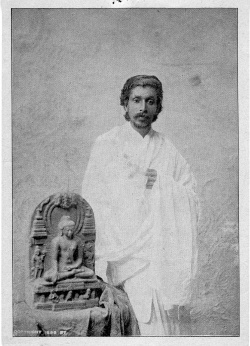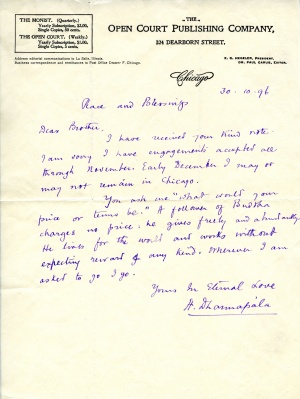Anagarika Dharmapala: Difference between revisions
No edit summary |
Pablo Sender (talk | contribs) No edit summary |
||
| Line 5: | Line 5: | ||
[[File:Dharmapala at Parliament.jpg|250px|thumb|Anagarika Dharmapala]] | [[File:Dharmapala at Parliament.jpg|250px|thumb|Anagarika Dharmapala]] | ||
== Early life == | == Early life == | ||
== Theosophical influence == | |||
In 1874, when Dharmapala was a boy, he attended a great debate between Christians and Buddhists that took place in Ceylon. When Colonel Olcott and Madame Blavatsky heard about this some time later, they wrote to the Buddhists Gunananda and Sumangala that, in the interest of universal brotherhood, they would come to Ceylon to help the Buddhists. Dharmapala wrote: | |||
<blockquote>The letters from Colonel Olcott and Madame Blavatsky were translated into Sinhalese and widely distributed. My heart warmed toward these two strangers, so far away and yet so sympathetic, and I made up my mind that, when they came to Ceylon, I would join them.<br> | |||
They did come to Colombo a few years later, when I was sixteen. The Buddhists entertained them royally. I remember going up to greet them. The moment I touched their hands, I felt overjoyed. The desire for universal brotherhood, for all the things they wanted for humanity, struck a responsive chord in me. I began to read their magazine. . . . I pondered on the conversations I had had with the two Theosophists. I made up my mind not to entangle myself in the net of worldly desires. I would endeavor from then on to devote my life to the welfare of others. Exactly how I was to carry out my resolve, I was not certain, but I felt that somehow the way would be found in the writings of Madame Blavatsky.<ref>Daniel Caldwell, ''The Esoteric World of Mme. Blavatsky'', (Wheaton, IL: Quest Books, 2000), ???.</ref></blockquote> | |||
Dharmapala eventually broke with the [[Theosophical Society]]. As scholar David McMahan pointed out, an important reason for this was the Theosophical teaching that all religions are branches of a universal Wisdom-Religion: | |||
<blockquote>One of the important factors in his rejection of theosophy centered on this issue of universalism; the price of Buddhism being assimilated into a non-Buddhist model of truth was ultimately too high for him.<ref>David L. McMahan, ''The Making of Buddhist Modernism'' (Oxford: Oxford University Press, 2008), 111.</ref></blockquote> | |||
== World's Parliament of Religions in 1893 == | == World's Parliament of Religions in 1893 == | ||
[[Henry Steel Olcott|Col. Olcott]] sponsored Dharmapala to be invited as a speaker by the managers of the first World Parliament of Religions, held at Chicago in 1893. He participated as a [[Theosophist]] and representative of Southern [[Buddhism|Buddhist]] school. | |||
W. Q. Judge wrote: | |||
<blockquote>Our own beloved brother and Fellow-Theosophist, H. Dhammapala, Secretary of the Maha Bodhi Society, has been commissioned to represent the Southern Buddhist Church.It is expected by the Auxiliary managers that he will be one'of the greatest attractions in the Parliament of Religions, and every courtesy will be extended to him by them during his stay in Chicago. The Local Committee on the Theosophical Congress hope to secure his services also during our sessions.<ref>???.</ref></blockquote> | |||
Dharmapala's talks, both at the general Parliament and during the two-day congress organized by the [[Theosophical Society]] as part of it, brought the teachings of the [[Gautama Buddha|Buddha]] to the attention of the Western world in a massive way for the first time. | |||
== Maha Bodhi Society == | == Maha Bodhi Society == | ||
| Line 19: | Line 38: | ||
</blockquote> | </blockquote> | ||
This letter was printed on the stationery of the [[Open Court Publishing Company]] in Chicago, which published works of many Theosophists and was highly engaged with the concept of interfaith parliaments. | This letter was printed on the stationery of the [[Open Court Publishing Company]] in Chicago, which published works of many Theosophists and was highly engaged with the concept of interfaith parliaments. | ||
==Online resources== | |||
===Articles=== | |||
*[http://theosophy.ph/encyclo/index.php?title=Dharmapala,_Anagarika# Anagarika Dharmapala] at Theosopedia | |||
== Notes == | == Notes == | ||
<references/> | <references/> | ||
[[Category:Buddhists|Dharmapala, Anagarika]] | [[Category:Buddhists|Dharmapala, Anagarika]] | ||
[[Category:Associates of HPB|Dharmapala, Anagarika]] | [[Category:Associates of HPB|Dharmapala, Anagarika]] | ||
| Line 27: | Line 51: | ||
[[Category:Lecturers|Dharmapala, Anagarika]] | [[Category:Lecturers|Dharmapala, Anagarika]] | ||
[[Category:Nationality Sri Lankan|Dharmapala, Anagarika]] | [[Category:Nationality Sri Lankan|Dharmapala, Anagarika]] | ||
[[Category:Famous people|Dharmapala, Anagarika]] | |||
Revision as of 16:57, 28 August 2014
ARTICLE UNDER CONSTRUCTION
ARTICLE UNDER CONSTRUCTION

Early life
Theosophical influence
In 1874, when Dharmapala was a boy, he attended a great debate between Christians and Buddhists that took place in Ceylon. When Colonel Olcott and Madame Blavatsky heard about this some time later, they wrote to the Buddhists Gunananda and Sumangala that, in the interest of universal brotherhood, they would come to Ceylon to help the Buddhists. Dharmapala wrote:
The letters from Colonel Olcott and Madame Blavatsky were translated into Sinhalese and widely distributed. My heart warmed toward these two strangers, so far away and yet so sympathetic, and I made up my mind that, when they came to Ceylon, I would join them.
They did come to Colombo a few years later, when I was sixteen. The Buddhists entertained them royally. I remember going up to greet them. The moment I touched their hands, I felt overjoyed. The desire for universal brotherhood, for all the things they wanted for humanity, struck a responsive chord in me. I began to read their magazine. . . . I pondered on the conversations I had had with the two Theosophists. I made up my mind not to entangle myself in the net of worldly desires. I would endeavor from then on to devote my life to the welfare of others. Exactly how I was to carry out my resolve, I was not certain, but I felt that somehow the way would be found in the writings of Madame Blavatsky.[1]
Dharmapala eventually broke with the Theosophical Society. As scholar David McMahan pointed out, an important reason for this was the Theosophical teaching that all religions are branches of a universal Wisdom-Religion:
One of the important factors in his rejection of theosophy centered on this issue of universalism; the price of Buddhism being assimilated into a non-Buddhist model of truth was ultimately too high for him.[2]
World's Parliament of Religions in 1893
Col. Olcott sponsored Dharmapala to be invited as a speaker by the managers of the first World Parliament of Religions, held at Chicago in 1893. He participated as a Theosophist and representative of Southern Buddhist school.
W. Q. Judge wrote:
Our own beloved brother and Fellow-Theosophist, H. Dhammapala, Secretary of the Maha Bodhi Society, has been commissioned to represent the Southern Buddhist Church.It is expected by the Auxiliary managers that he will be one'of the greatest attractions in the Parliament of Religions, and every courtesy will be extended to him by them during his stay in Chicago. The Local Committee on the Theosophical Congress hope to secure his services also during our sessions.[3]
Dharmapala's talks, both at the general Parliament and during the two-day congress organized by the Theosophical Society as part of it, brought the teachings of the Buddha to the attention of the Western world in a massive way for the first time.
Maha Bodhi Society
Lecturing

Mr. Dharmapala was much in demand as a speaker. on October 30, 1896, he wrote this response to a request by Dr. J. D. Buck to schedule a lecture:
I have received your kind note. I am sorry I have engagements accepted all through November. Early December I may or may not remain in Chicago.
You ask me "What would your price or terms be." A follower of Buddha charges no price; he gives freely and abundantly. He lives for the world and works without expecting reward of any kind. Wherever I am asked to go I go.[4]
This letter was printed on the stationery of the Open Court Publishing Company in Chicago, which published works of many Theosophists and was highly engaged with the concept of interfaith parliaments.
Online resources
Articles
- Anagarika Dharmapala at Theosopedia
Notes
- ↑ Daniel Caldwell, The Esoteric World of Mme. Blavatsky, (Wheaton, IL: Quest Books, 2000), ???.
- ↑ David L. McMahan, The Making of Buddhist Modernism (Oxford: Oxford University Press, 2008), 111.
- ↑ ???.
- ↑ A. Dharmapala letter to J. D. Buck. Dated October 30, 1896. Cincinnati Theosophical Society Papers. Records Series 20.02.01. Theosophical Society in America Archives.